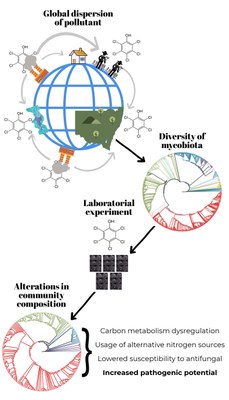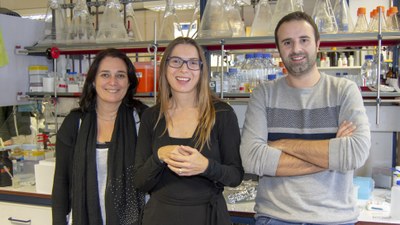In Nature nothing is lost, nothing is created, everything is transformed
Pentachlorophenol (PCP), is an organochlorine compound that has been used as a pesticide and a disinfectant. Although currently banned and classified as persistent organic pollutant (POP), it is still used in many locations and also globally dispersed through long-range atmospheric and oceanic transport. In Cristina Silva Pereira Lab they have been studying the impact of pollution onto the microbial diversity on the soil and used PCP as a model. Previously, they have shown that in cork oak forests in North Africa the fungal community is involved in the degradation pathway of PCP. Now, in laboratory studies they have observed that PCP degradation and mineralisation dysregulated the carbon and nitrogen metabolisms of the fungal metacommunity, and augmented their pathogenic potential. The results were published now in Microbiome.

Schematic overview of the strategy used to conduct the study, and brief snapshot of the obtained results.
"We have detected that PCP altered greatly the composition and functioning of a metacommunity of fungi, eliciting the secretion of proteins associated with pathogenesis, and decreasing its overall susceptibility to fungicides.", said Cristina Silva Pereira, corresponding author. "We believe this constitutes an important breakthrough with far ranging scientific and technical impact. We hope that further studies will help us disclose how pollution may contribute to the increasing emergence of pathogenic fungi."
These results were also discussed in Nature Research Microbiology Community blog.

Original article
Specialisation events of fungal metacommunities exposed to a persistent organic pollutant are suggestive of augmented pathogenic potential
Martins, C., Varela, A., Leclercq, C. C., Núñez, O., Větrovský, T., Renaut, J., Baldrian, P. and Pereira, C. S. (2018) “Specialisation events of fungal metacommunities exposed to a persistent organic pollutant are suggestive of augmented pathogenic potential,” Microbiome, 6(1), p. 208. doi: 10.1186/s40168-018-0589-y.
In the media
Poluentes tornam fungos mais resistentes a antibióticos, Público, 27.11.2018
Poluentes tornam fungos mais capazes de resistir a antibióticos e causar doenças, RTP, 27.11.2018
Poluentes tornam fungos mais capazes de resistir a antibióticos e causar doenças, SIC, 27.11.2018
Poluentes tornam fungos mais capazes de resistir a antibióticos, TVI, 27.11.2018
Poluentes tornam fungos mais capazes de resistir a antibióticos e causar doenças, TSF, 27.11.2018
Poluentes tornam fungos mais capazes de resistir a antibióticos e causar doenças, Diário de notícias, 27.11.2018
Fungos aumentam capacidade de infeção em contacto com poluentes, TV Europa, 27.11.2018
Poluentes tornam fungos mais capazes de resistir a antibióticos e causar doenças, Destak, 27.11.2018
Contaminants make fungi more resistant to antibiotics | pesticides, Tech Portugal, 27.11.2018
Poluentes tornam fungos mais capazes de resistir a antibióticos e causar doenças, Sapo lifestyle, 28.11.2018


